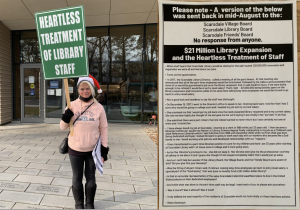Is Netflix’s Atypical Too Typical?
October 8, 2018
Netflix recently premiered a second season of one of its more controversial shows, Atypical, which tells the story of a child on the autistic spectrum and how he navigates his way through both high school and adolescence. Many of the challenges that the protagonist deals with on the show may seem, well, typical. For example, college admissions becomes a much debated issue among the family of the protagonist, as well as how Sam, the protagonist, deals with his love life and social connections both inside and outside of his school. All of these topics are twisted, however, by including the added social and psychological challenges that autism brings. Although the subject matters discussed on the show are true to being realistic problems that autistic children, teens, and adults are faced with, some critics believe that the ways in which these challenges are talked about on the show are overly mainstream, and are expressed way more lightly than they should be.
The first season follows Sam Gardner, an 18-year-old autistic student enrolled at a public school, and focuses on the life of his sister and that of his parents. The show discusses Sam’s love life, and how the social issues that come with his autism play into this, at the same time developing his sister’s romance. It can even be said that the two love lives ensuing at the same time on the show are able to be juxtaposed, seeing as Sam’s sister doesn’t have the same lacking in social understandings that Sam possesses. Sam’s platonic relationships are unpacked as well, and we are introduced to Zahid, a true friend of Sam’s, who he has met while working after school at a local tech franchise. Season one of the show premiered over a year ago, was composed of eight episodes, and received positive reviews for the most part. One key element that most viewers agreed upon when commenting on the show was the lack of representation for autistic actors on the series. Many felt that the autistic viewpoint from which the show was mostly told from was overly normalified.
Season two of the show was recently released, and dives even deeper into the relationships explored within the first season. Here, the show touches on the challenges that having an autistic child can pose on relationships inside and outside of the family, and discusses the strain that it can cause. In this season, an affair between Sam’s mom and a new character is revealed, and, as a result, the relationship between Sam’s parents continues to evolve. The quickly broken relationships around the house continue to erupt, and the affair originally isn’t intended to be public to Sam due to his families worries over how he might process it, however he finds out eventually in the series. The show continues to follow how the family struggles to piece itself back together, as well as demonstrate the challenges that changes and transitions can have on an autistic child.
The controversy continues as some reviewers feel that season two loses focus on the protagonist, and how he deals with the issues pertaining to his autism. Season two devotes more time to the issues pertaining to other characters and family members within the show than before in the first season, and some reviewers see this as a negative. Others view this as a positive however. People feel that this is more realistic and ‘typical’ to how a family with a special needs member would behave.
As a viewer of the show and having had no experiences living with special needs family members, I view this Netflix series as an eye opening take to the classic sitcom series, and I appreciate the easily accessible experience I was able to have due to how mainstream this show has become. I personally can not comment on how accurate this show is in demonstrating what it is like to grow up with an autistic family member, but believe this show is an excellent and fair beginning to opening up a topic that should be more public and talked about. I give this show two thumbs up.


























